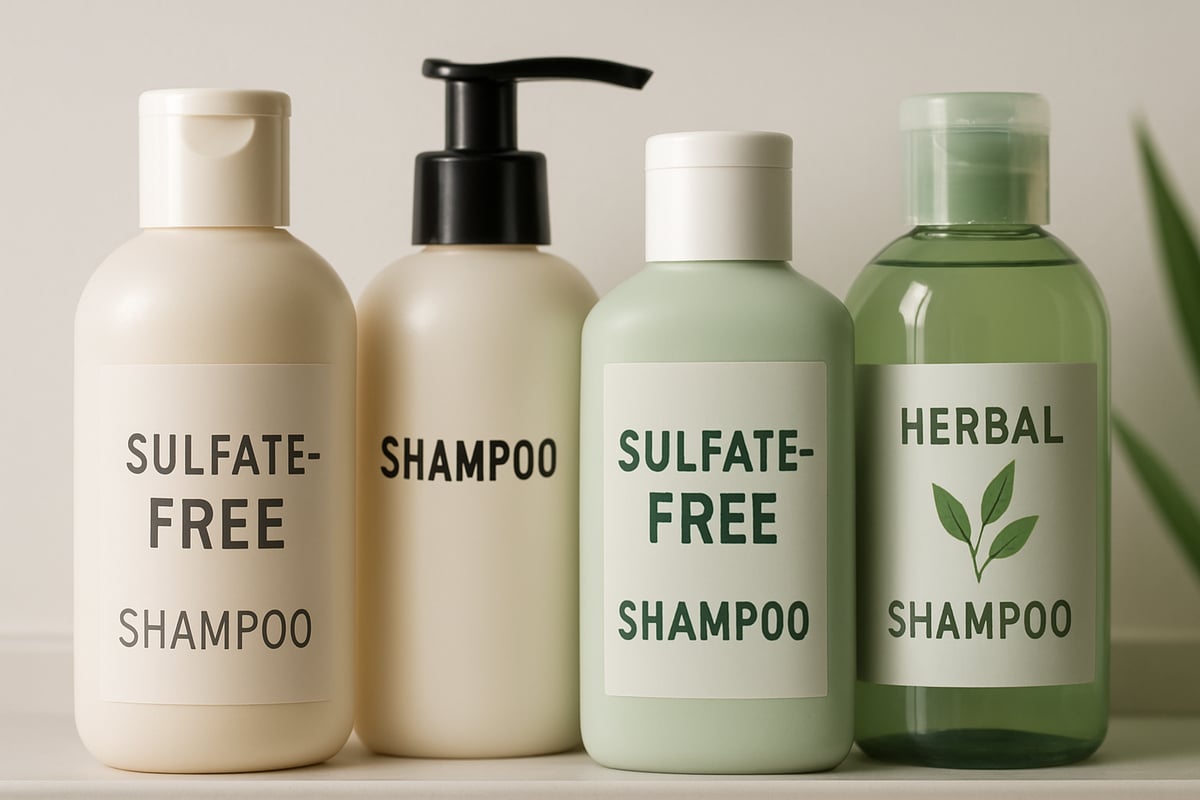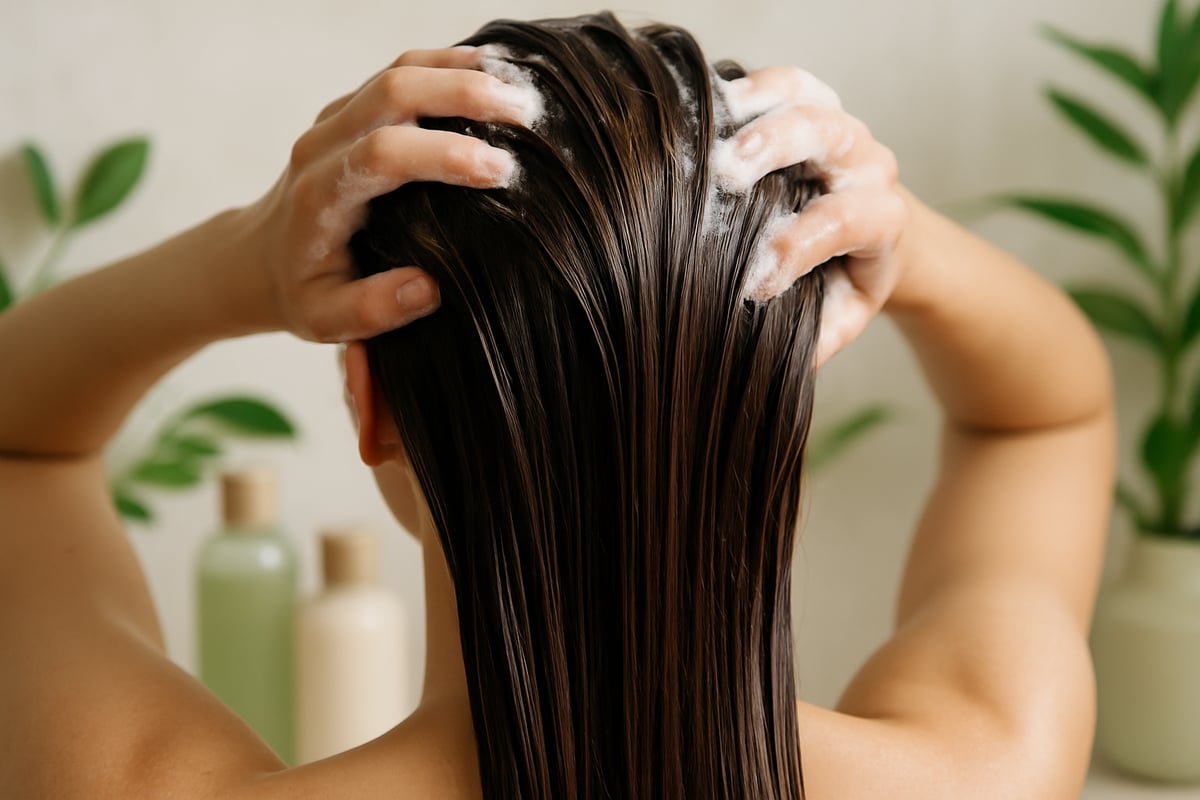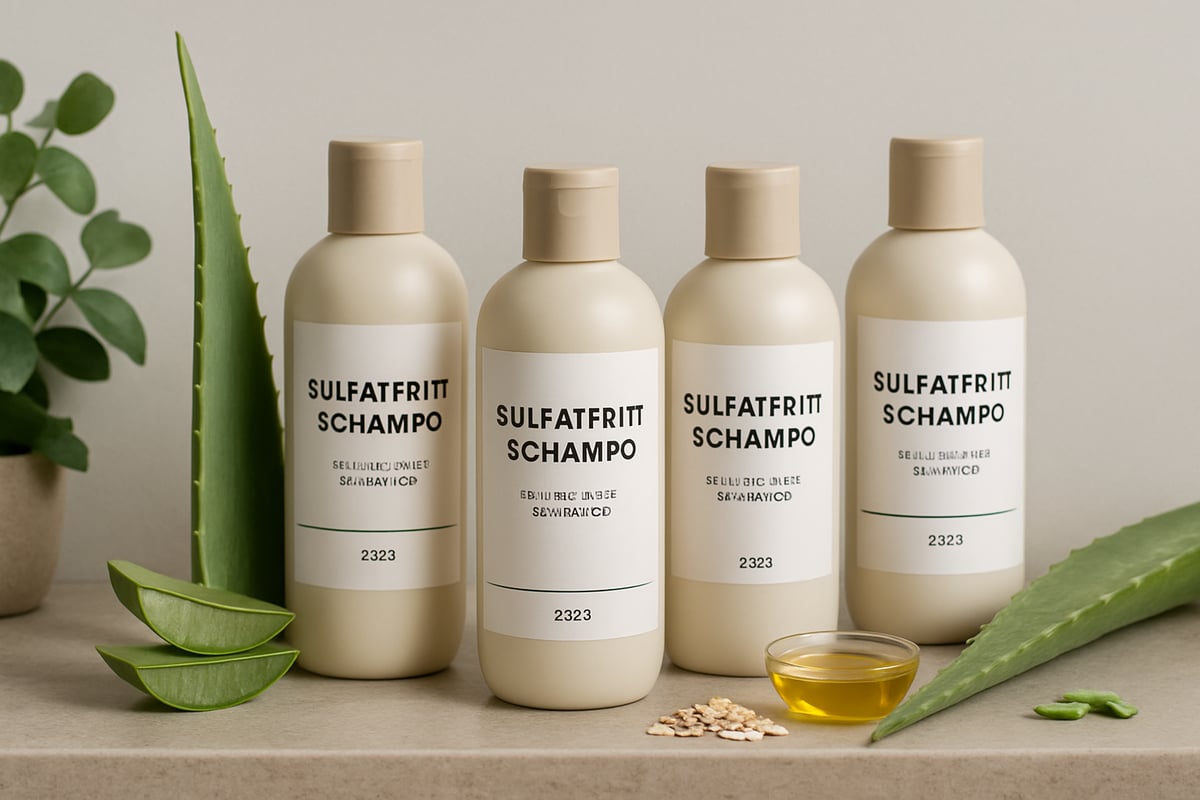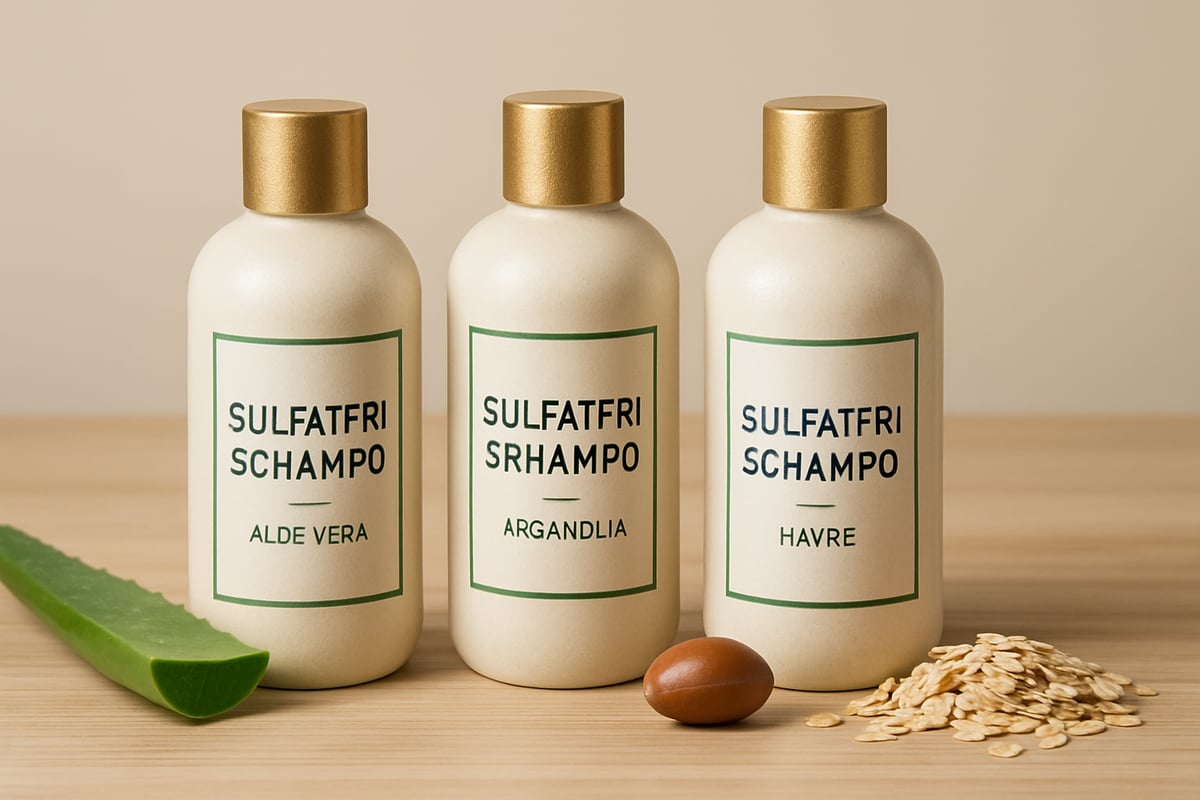Have you noticed that your hair feels dry, frizzy or irritated after washing? Many people experience this and are now looking for gentler alternatives to traditional shampoos. This guide will help you understand why more and more people are choosing sulfate-free shampoos and how to find the right product for your hair in 2025.
Sulfates are often used in shampoos to create lather and cleanse, but they can also dry out both hair and scalp. With the increasing demand for healthier and more sustainable hair care products, interest in sulfate-free alternatives has grown significantly.
In this article, you'll learn more about the benefits of sulfate-free shampoo, which ingredients to avoid, a step-by-step guide to choosing the right product, tips for different hair types, and answers to frequently asked questions. Follow the guide to experience the difference and take the next step towards better hair health.
What are sulfates and why should you avoid them?
Sulfates are cleansing agents that are often used in traditional shampoos. The most common are Sodium Lauryl Sulfate (SLS) and Sodium Laureth Sulfate (SLES). These ingredients create the rich lather many people associate with shampoo. According to industry reports from 2023, over 60% of commercial shampoos contain sulfates, making them one of the most common detergents on the market.
Sulfates work by effectively dissolving grease and dirt from your hair and scalp. However, this powerful cleansing isn’t always a benefit. Sulfates can also strip away the natural oils that protect your hair and scalp. The result is often hair that feels dry, frizzy, or irritated, especially if you rarely use sulfate-free shampoos or if you have sensitive skin.
Many people notice negative effects of sulfates, especially if they wash their hair frequently. Common signs include:
- Dryness and itching of the scalp
- Loss of color in color-treated hair
- Increased frizz and brittleness
- Irritation or rash
Research shows that people with sensitive scalps, eczema or allergies are at greater risk of reacting to sulfates. The strongest types, such as SLS, are known to cause skin irritation even at low concentrations. Milder surfactants, such as Coco Glucoside or Decyl Glucoside, have become popular alternatives in sulfate-free shampoos, as they cleanse gently without drying out.
It is also important to understand the difference between strong and mild surfactants. Strong surfactants such as SLS and SLES quickly remove both dirt and natural oils, while mild surfactants cleanse without disturbing the scalp's balance. The table below shows a comparison:
| Type of surfactant | Cleaning power | Risk of dehydration | Common in sulfate-free shampoos |
|---|---|---|---|
| SLS, SLES | High | High | No |
| Coco Glucoside | Mild | Low | Yes |
| Decyl Glucoside | Mild | Low | Yes |
Some hair types are particularly sensitive to sulfates. Curly, dry, or colored hair often fare better with sulfate-free shampoos because these hair types are more prone to dryness and damage. People with sensitive scalps or skin conditions like psoriasis are also advised to choose milder products.
The demand for gentle, natural hair care alternatives has increased significantly in the Nordic region in recent years. Consumers are increasingly looking for gentle solutions that preserve the hair's natural balance and minimize the risk of irritation. If you want to delve further, you can read more in the article What are sulfates, and why you should avoid them .
Choosing a sulfate-free shampoo isn't just about protecting your hair from drying out. It's also about taking sensitive scalps into account, reducing the risk of allergic reactions, and contributing to a more sustainable hair care routine. By understanding what sulfates are and how they affect your hair, you can make a more informed choice for your hair health.

Benefits of sulfate-free shampoo
Choosing a sulfate-free shampoo has several tangible benefits for both your hair and scalp. More and more people are discovering that traditional shampoos can contribute to dryness and irritation, especially if you have sensitive skin or treated hair. Below, we’ll go over the most important reasons to switch to sulfate-free alternatives, what effects you can expect, and why these products are becoming increasingly popular.

Gentler on hair and scalp
Sulfate-free shampoos are known to be much gentler on both hair and scalp than traditional products. Because sulfates often strip hair of its natural oils, they can cause irritation, itching, and dryness. Sulfate-free alternatives help maintain moisture balance and reduce the risk of redness or flaking.
For people with sensitive scalps, children, or those suffering from eczema and psoriasis, sulfate-free shampoos are often recommended by dermatologists and hairdressers alike. The gentle cleansing means that even the most sensitive hair types can be washed regularly without drying out or irritating the skin, making these products a safe choice for the whole family.
Better for colored and treated hair
One of the biggest problems with regular shampoo is its effect on colored and chemically treated hair. Sulfates can quickly wash out pigment and cause color to fade prematurely. With sulfate-free shampoo, hair color will be more durable and shiny for longer.
Statistics show that 80 percent of hairdressers recommend sulfate-free products to clients with color-treated hair. The products protect the hair's structure and reduce the risk of wear and tear after chemical treatments. You can read more about the range of sulfate-free shampoos and conditioners if you want to find the right product for your treated hair.
Environmental and sustainability aspects
Environmental considerations are an important factor for many people when choosing a sulfate-free shampoo. Sulfate-free products often contain more natural ingredients, which are gentler on both hair and nature. Because they lack strong surfactants and unnecessary chemicals, the load on both water and the ecosystem is reduced with each wash.
Organic and vegan options are rapidly growing in the market. Many brands are investing in biodegradable packaging and environmentally friendly processes. So choosing a sulfate-free shampoo is not only good for your hair, but also for the planet.
Long-term effects on hair health
Using sulfate-free shampoos provides long-term benefits to the quality of your hair. Because natural oils are better preserved, your hair becomes stronger, softer, and more resistant to external stressors. Regular use reduces the risk of split ends and frizz, making your hair look healthier.
Over time, many people notice that their hair regains its natural shine and balance. A gentler washing routine allows the scalp to recover and creates a healthier environment for hair growth. That's why sulfate-free shampoos are a natural part of a long-term hair care routine.
How to choose the right sulfate-free shampoo – Step-by-step
Finding the right sulfate-free shampoo can feel overwhelming with all the choices on the market. To make your journey to healthier hair easier, we’ve taken you step-by-step through the process of choosing the best option for you. Below is a structured approach to help you avoid common mistakes and find a sulfate-free shampoo that suits your hair type and needs.

1. Know your hair and your needs
Start by analyzing your hair and scalp. What hair type do you have? Is your hair dry, oily, curly, straight, colored, or extra sensitive? The answer to these questions will determine which sulfate-free shampoo is best for you.
Curly hair tends to be drier and often needs extra moisture. Colored hair is at risk of losing its shine if you don't choose the right formula. If you have a sensitive scalp, a mild, fragrance-free, sulfate-free shampoo is often the best choice.
- Identify if your hair is damaged, colored or chemically treated.
- Consider if you have problems with itching, irritation or eczema.
- Customize your choice according to whether you want volume, shine or hydration.
Understanding your unique needs will help you choose a sulfate-free shampoo that really delivers results. Remember, different hair types react differently to ingredients, so pay attention to changes.
2. Read the ingredient list carefully
When looking for a sulfate-free shampoo, the ingredient list is your best friend. Many products are marketed as sulfate-free but may still contain harsh surfactants or other drying agents.
Learn to recognize common sulfates like Sodium Lauryl Sulfate (SLS) and Ammonium Lauryl Sulfate. Also, substances like Sodium Laureth Sulfate (SLES) should be avoided if you want to be sure that your sulfate-free shampoo is truly gentle.
Tips for interpreting the table of contents:
- Avoid products with a lot of alcohol or synthetic fragrances.
- Look for gentle cleansers like Coco Glucoside and Decyl Glucoside.
- Please choose organic and natural ingredients.
A careful review of the ingredients increases the chance that you will find a sulfate-free shampoo that is truly mild and caring.
3. Choose according to hair type and problem
Every hair type has different needs. For dry hair, choose a sulfate-free shampoo with moisturizing ingredients like aloe vera, argan oil, or shea butter. Colored hair benefits best from formulas that protect and preserve color, preferably with UV protection and antioxidants.
For those with sensitive scalps, perfume-free and allergy-tested alternatives are preferable. The market today offers a wide range, and you can, for example, find inspiration among Hair care for all hair types to see different varieties of sulfate-free shampoos adapted to specific needs.
- Curly hair: Invest in extra moisture and nutrition.
- Fine hair: Look for volumizing but gentle varieties.
- Damaged hair: Choose strengthening and repairing ingredients.
Adapting your choice to your hair type and any problems makes a big difference to the end result.
4. Look at certifications and sustainability
Certifications are an important support when you want to choose a sulfate-free shampoo that is both gentle on you and the environment. Organic, vegan and cruelty-free labels show that the product meets high standards for ingredients and manufacturing.
Common certificates to look out for:
- COSMOS Organic
- Ecocert
- Vegan Society
Statistics show that sales of organic shampoo increased by 20 percent in Sweden in 2024. Choosing certified products ensures that your sulfate-free shampoo is a sustainable choice, both for you and the planet.
5. Test and evaluate the results
Once you've chosen a sulfate-free shampoo, it's important to give your hair time to adjust. A transition period of two to four weeks is common, as your hair and scalp may need to adjust to the gentler cleansing.
Tips for evaluation:
- Combine with conditioner without sulfates and silicones for best effect.
- Note if the hair feels stronger, less frizzy or if the itching decreases.
- Don't give up too soon, some results take time to appear.
Evaluating the effectiveness of your sulfate-free shampoo requires patience, but in the long run you will often get healthier and more balanced hair.
6. Avoid common pitfalls
It's easy to fall into the trap of blindly trusting the promises on the packaging. Shampoo without sulfates may be on the label, but it's always important to double-check the contents.
Common pitfalls to watch out for:
- Cheaper products may contain other strong cleaning agents.
- Marketing can be misleading without real substance.
- Don't forget that a sulfate-free shampoo doesn't always suit all hair types, so test it out.
Being attentive and critical in your choice of sulfate-free shampoo increases the chance that you will find a product that really works and provides the desired effect.
Ingredients to Look for and Avoid in Sulfate-Free Shampoos
Choosing the right sulfate-free shampoo isn't just about avoiding a particular ingredient. It's just as important to understand which ingredients actually benefit your hair and which ones can cause damage or irritation. The ingredient list is your best friend when it comes to finding a sulfate-free shampoo that suits your needs.
Reading up on natural and synthetic substances makes the choice easier and contributes to healthier hair in the long term.

Natural and nourishing ingredients
When looking for a sulfate-free shampoo, it's wise to focus on natural and caring ingredients. These substances help moisturize, strengthen, and protect your hair. Examples of such ingredients include aloe vera, argan oil, shea butter, coconut oil, and oat extract. They are known for their soothing and nourishing properties, especially for dry or sensitive hair.
According to Parfumdream's trend report, 70% of new shampoos launched in 2024 were natural-focused. This clearly shows how demand for sulfate-free shampoos with natural ingredients is increasing. Many are also choosing organic and vegan alternatives to reduce the risk of allergies and environmental impact.
Ingredients to avoid
Not all sulfate-free shampoos are automatically gentle. Many products may contain other harsh surfactants or synthetics that can dry out or irritate the scalp. Some common ingredients to avoid include:
- Synthetic fragrances
- Parabens
- Silicones
- PEG (polyethylene glycol)
- Mineral oils
Also watch out for hidden sulfates and harsh detergents, such as Sodium Laureth Sulfate or Ammonium Lauryl Sulfate. These can sometimes be found in products that are marketed as sulfate-free shampoos. By choosing sulfate-free shampoos with natural ingredients, you reduce the risk of allergies and are kind to the environment.
| Ingredient to look for | Ingredient to avoid |
|---|---|
| Aloe vera | Synthetic fragrances |
| Argan oil | Parabens |
| Shea butter | Silicones |
| Coconut oil | PEG |
| Oat extract | Mineral oils |
How do different ingredients affect the scalp and hair quality?
The ingredients found in a sulfate-free shampoo can have a big impact on both your hair and scalp. Natural oils and plant extracts, like chamomile and argan oil, help soothe and balance your scalp. They also preserve your hair's natural moisture.
Synthetic substances, especially silicones and mineral oils, can clog pores and disrupt the skin's microflora, which can lead to irritation or imbalance, especially if you have sensitive skin. That's why it's important to choose sulfate-free shampoos with care.
Examples of popular ingredients in 2025 products
In 2025, we see a clear trend towards innovative and multifunctional ingredients in sulfate-free shampoos. Probiotics are used to strengthen the scalp's microflora, while rice protein and oat peptides contribute to increased strength and elasticity in the hair. Fermented plant extracts are also becoming increasingly common, thanks to their moisturizing and protective properties.
Leading brands are combining these ingredients to offer sulfate-free shampoos that deliver both visible and long-lasting results, making it easier to find a product that is tailored to your hair and needs.
Tips for different hair types and needs
Choosing the right sulfate-free shampoo is crucial to meeting your hair’s unique needs. Whether your hair is dry, colored, curly, or has a sensitive scalp, there are customized solutions that will improve both hair health and well-being. Below are specific tips for four common hair types and needs, so you can easily find the right path to healthier hair.
Dry and damaged hair
For those with dry or damaged hair, it's important to invest in a sulfate-free shampoo with moisturizing properties. Sulfate-free products gently cleanse without stripping away the natural oils that hair needs to maintain its moisture balance. Ingredients like shea butter, argan oil, and aloe vera are especially valuable for nourishing and strengthening the hair shaft.
Avoiding strong surfactants reduces the risk of further drying out. Also choose products without alcohol, as these can easily worsen dryness. A tip is to supplement with a moisturizing conditioner for best results. Regular use of sulfate-free shampoo can make hair softer, more manageable and reduce the risk of split ends.
Colored or chemically treated hair
Colored and chemically treated hair requires special care. A sulfate-free shampoo preserves the intensity of color longer and protects the hair shaft from wear and tear from chemical treatments. Sulfate-free options cleanse gently, which reduces color loss and helps hair maintain its shine.
Look for products that are labeled as color-preserving or repairing. Ingredients like rice protein, keratin, and natural oils can provide extra protection and strength. Avoid shampoos with strong fragrances and alcohol, as these can irritate the scalp and shorten the life of the color. With the right sulfate-free shampoo, your treated hair will receive both care and long-lasting protection.
Curly or wavy hair
Curly and wavy hair is often drier than straight hair and therefore requires extra moisture and gentle cleansing. A sulfate-free shampoo is ideal, as it cleanses without disrupting the natural oils needed to define and maintain curls. Ingredients like coconut oil, oat extract, and shea butter help reduce frizz and increase hair elasticity.
Avoid products with strong surfactants, as they can make curls dull and unmanageable. For best results, combine with a moisturizing leave-in product or conditioner. Regular use of sulfate-free shampoo helps to enhance the natural shape of curls and gives a soft, shiny result.
Sensitive scalp and allergies
If you have a sensitive scalp or are prone to allergic reactions, it's important to choose a sulfate-free shampoo that is fragrance-free and hypoallergenic. Natural extracts like oats and chamomile can soothe and moisturize the scalp without causing irritation. Sulfate-free products minimize the risk of redness, itching, and discomfort.
Choose products that are dermatologically tested and free of synthetic fragrances. For more guidance on skin and hair care for sensitive people, visit Tips for Sensitive Skin and Scalp . A customized sulfate-free shampoo can help maintain a balanced and healthy scalp over time.
Frequently asked questions about sulfate-free shampoo
Choosing the right sulfate-free shampoo often raises many questions. Below we answer the most common concerns to guide you to a more informed choice. Regardless of your hair type or previous experience, these answers can help you understand what a sulfate-free shampoo means and how it affects your hair care.
How do I know if a shampoo is truly sulfate-free?
To ensure that you are using a sulfate-free shampoo, you need to read the ingredient list carefully. Look for names like Sodium Lauryl Sulfate (SLS) or Sodium Laureth Sulfate (SLES), which are common sulfates. If these are missing, there is a good chance that the product is sulfate-free. Some shampoos are marketed as "sulfate-free," but may still contain other strong surfactants, so always double-check the ingredients list to be sure. Certifications like COSMOS or Ecocert can also be helpful. If you want to learn more about how sulfates affect your hair, we recommend the article Sulfates and Silicones in Shampoo . With the right information, it will be easier to choose a sulfate-free shampoo that suits your needs.
Can I use sulfate-free shampoo every day?
Yes, sulfate-free shampoos are generally milder than traditional shampoos and can therefore be used daily by most people. Because these products cleanse the hair gently, you do not risk drying out your scalp or hair as much as with shampoos that contain sulfates. However, if you have very oily hair or use styling products frequently, it may be a good idea to supplement with a deep cleansing wash from time to time. For sensitive hair types and children, sulfate-free shampoo is particularly beneficial, as it reduces the risk of irritation. With the right sulfate-free shampoo, you get a balanced hair care routine that also works with daily use.
How long will it take before I notice a difference?
When switching to a sulfate-free shampoo, expect a transition period of two to four weeks. During this time, your hair may feel different, such as heavier or less lathering, as your hair and scalp adjust to the gentler cleansing. After this period, you will usually notice that your hair feels softer and healthier. For some, it may take longer, depending on previous products and hair type. Giving your hair time to adjust to a sulfate-free shampoo is crucial for best results. Follow with a sulfate-free conditioner for additional care.
Is sulfate-free always better?
Sulfate-free shampoo is an excellent choice for most hair types, especially if you have a sensitive scalp, colored or dry hair. However, there are exceptions. Some hair and scalps may need more intensive cleansing, for example, if your hair is very oily or after using styling products. It is therefore wise to test your hair and consult a hairdresser if you are unsure. If you want to read more about when sulfates may be suitable or not, see the article Sulfates – Are they dangerous? . In conclusion, sulfate-free shampoo is often the better choice, but not always for everyone.
After reading about the benefits of sulfate-free shampoo and how to find the right product for your hair, you don't have to feel alone in your quest for natural beauty. We know it can be difficult to navigate ingredient lists and sustainability labels, but you can always choose to invest in caring products that are carefully selected for both quality and the environment. If you want to take the next step towards healthier hair and a gentler routine, you can confidently explore our selection of natural hair care products.
See our range


